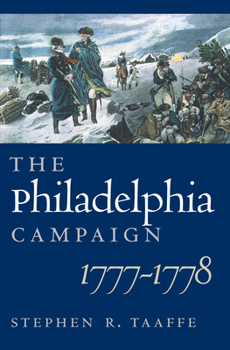The Philadelphia Campaign, 1777-1778
American fortunes were at a low point in the winter of 1777-78. The British had beaten the Continental Army at Brandywine and Germantown, seized the colonial capital of Philadelphia, and driven Washington's soldiers into barren Valley Forge. But, as Stephen Taaffe reveals, the Philadelphia Campaign marked a turning point in the American Revolution despite these setbacks. Occurring in the middle of the war in the heart of the colonies, this...
Format:Hardcover
Language:English
ISBN:070061267X
ISBN13:9780700612673
Release Date:November 2003
Publisher:University Press of Kansas
Length:344 Pages
Weight:1.35 lbs.
Dimensions:1.2" x 6.3" x 9.3"
Customer Reviews
1 rating
Worthwhile, but Mildly Disappointing
Published by Thriftbooks.com User , 16 years ago
Stephen Taaffe has written a workmanlike single-volume study of the duel between the American revolutionary army and the British regular army in and around New York and Philadelphia during 1777 and the first half of 1778. He describes all of the major players--Washington, Howe, Greene, Cornwallis, von Steuben, and Clinton--and hits the highlight events--the battles of Brandywine, Germantown, Paoli, and Monmouth, efforts to close the Delaware River, the camp at Valley Forge, the Conway affair, and Howe's "going away party,"--but is strongest in offering his analysis of the campaign. Simply, Taafe credits Washington for waging a successful campaign by waging a war of attrition, in which the survival of his army and time threatened to wear down British support for the war. At the same time, he criticizes the tactically successful Howe with a gross failure to develop a war-winning strategy and integrate it with his military campaigns. In other words, Washington understood the nature of revolutionary conflict while Howe persisted in fighting an 18th century European war. Taaffe offers ample support for his argument, tracing Washington's opportunistic approach to battle and Howe's persistent belief that he must either crush the American army or receive reinforcements sufficient to exert the crown's authority beyond the coastal enclaves he was able to garrison. In doing so, he offers a valuable reminder of the need to integrate military operations with political aims given the context in which a war takes place. Yet, something is missing. The previous reviewer noted an extreme paucity of maps, a concern with which this reviewer wholeheartedly agrees. Offering a campaign history without at least one solid campaign or geographical map and battle maps that are barely useful is disappointing. Taaffe occasionally slips into contemporary colloquial phrases that can be jarring. That said, by themselves, neither limitation is fatal. Instead, The Philadelphia Campaign, 1777-1778 left me disappointed largely because it left me wanting more. Due perhaps to the book's brevity (just 238 pages), Taaffe only summarizes significant events rather than really exploring them. For example, he largely passes off the Conway affair, in which Washington mobilized political resources and employed his considerable political talents to fend off a "conspiracy" to replace him with Horatio Gates, as largely a figment of Washington's imagination, if not the purposeful victimization of General Conway in order to make an example of him. Just because Conway was arguably guilty of a mere indiscretion, if not the specific indiscretion for which he was attacked, does not mean that he was not in fact conspiring with Gates and his allies to replace Washington. Indeed, Henry Laurens, the President of Congress, clearly believed that there was a movement afoot to remove Washington from command. Taaffe seems not to appreciate the degree to which some politicians (including Wash






